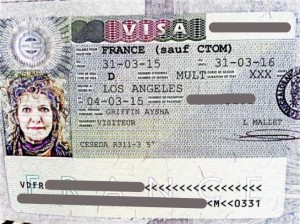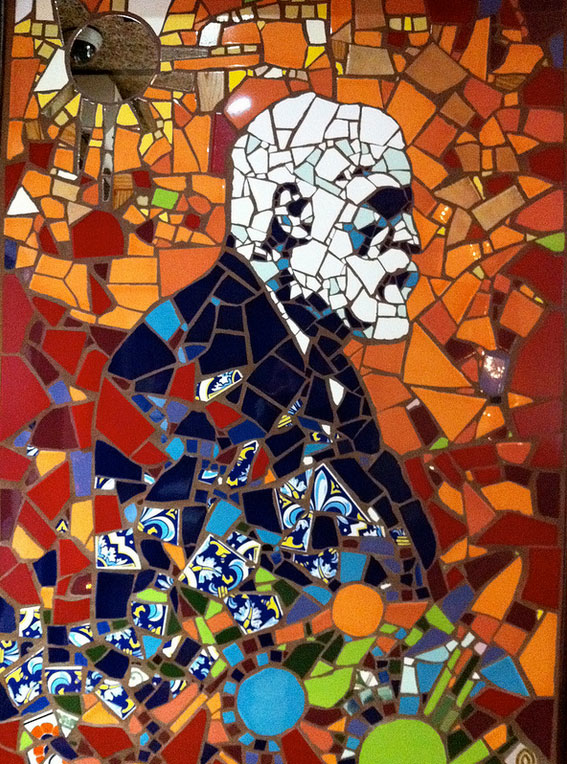 The Saga of Acquiring a French long-stay Visa
The Saga of Acquiring a French long-stay Visa
“There must be a way to stay in Europe!” I thought after arriving in Madrid in May 2014, determined to pursue a long-time dream of living somewhere in southern Europe. After countless hours of online research and talking with immigration attorneys, bankers and small business consultants, I am happy to tell you what I discovered.
This long post is of specific interest to U.S. citizens who would love to live in Europe, and does not apply to many of my readers. Please share with friends to whom it applies, leave comments and help me promote it via your social media channels. Thanks! I will be posting more travel and author-related articles in the near future, so if you have not yet subscribed for email alerts I encourage you to do it now and also join me on Facebook and Twitter.
First, let me clarify a few basics so there are no misunderstandings. If you are a U.S. and Canadian tourist planning to visit Europe for less than 3 months you do NOT need to apply for a visa, as it is automatically granted upon arrival. (I have not research regulations regarding other nationalities).
This law governs all non-EU citizens
Every country in Europe, even those not officially in the European Union like Switzerland, Norway, Iceland and Liechtenstein – with the exception of the UK and Ireland – has signed the Schengen Agreement. This allows open borders across Europe for all EU nationals, and a limit of 90 days (out of 180 days) for all non-EU citizens. Once you arrive in the EU, the clock starts ticking and you have 90 days. Even if you leave and return, your 90 days started upon first arrival and when they are up, you must then be out of the EU for at least 90 days before returning. The UK typically grants a 6-month tourist visa if you have health insurance (I recommend WorldNomads), “sufficient funds,” agree not to seek employment, and seem legitimate.
Anecdotally, I’ve heard of tourist-visa holders slightly overstaying their 3 months and leaving without incident from Spain or Italy (which seem more lenient in enforcement than other nations), while other tourists being reprimanded, fined and even barred from returning to the EU for up to 10 years.
I’ve also read of a loophole to avoid having one’s passport stamped altogether: taking the Eurostar from London to Paris where there has been no immigration at Gare du Nord railway station. But then, how does one prove when they arrived? We live in a highly-controlled and computerized world where everyone is trackable, so why risk fine or being a persona non grata?
Special Programs for Freelancers
The only information I found that might permit staying on in the EU, after having arrived on a tourist visa, are special programs for freelancers in Berlin Germany and for self-employed in The Netherlands under the Dutch-American Friendship Treaty. You must be there, show a year’s lease, open a bank account and deposit several thousand euros as a sort of bond, prove you are self-supporting, buy their health insurance, and a pension plan if over 45, and be committed to living there. If this works for you, it may be worth pursuing. However, as in with all information herein, laws change continually so do your research. Hiring a facilitator or attorney specializing in these programs is recommended.
Actually Getting a Visa
So, if you are a non-EU passport holders, how can you get a visa to stay beyond 90 days in the EU?
If you are fortunate enough to have proof a parent or grandparent born in Europe, you may qualify for residency or citizenship in that country. In any case, you must apply for in your country of origin and/or residence.
If you have a large sum of money to invest, you can buy your way into residency in some countries. Spain, for example, offers residency if you purchase a home for 500,000 or more euros.
You can marry an EU citizen although, as in the U.S., marriage does not necessarily grant immediate residency and proof of the relationship’s authenticity may be required. Spain, I’m told, is the most lenient regarding this.
Other than these exceptions, no matter which EU country you choose – the regulations for each vary widely and I can speak only to my experience with Spain and France – there will be a lot of qualifications you must meet, paperwork to gather, bureaucratic hoops through which to jump, long-distance trips to your Consulate office (unless you happen to live in the same city as the consulate), money to be paid whether or not your receive a visa, and time to wait for an answer. Every nation’s visa rules and process can be found via an online search. Some country’s requirements are easier to fulfill than others.
Spanish Visa
As a resident of New Mexico, applying for a Spanish visa would have required two trips to Houston to the Spanish Consulate for my region; the first appointment to drop-off all the paperwork and the second to pick it up. I could apply for a 6 or 12-month visa as an au pair, culture and language assistant, student, unpaid intern, for religious activities or residency. Each option requires elaborate proofs. For example, as a student, you must prove that you’ve paid the institution in advance for the entire time, say a year. You cannot receive a refund should you decide not to attend and the school is bound to report you to the consulate, which would likely revoke your extended visa.
The Spanish consulate’s website also cites a four-month wait time. When I considered the cost of the two trips, the wait time, and the complications of their visa requirements, I gave up, thinking I’d either 1. Continue doing the 3 months in/3 months out, 2. Stay illegally and risk consequences, or 3. Find a Spaniard to marry (actually, the easiest way to get Spanish residency)… but then the matter of finding one is easier said than done! Seriously, marriage is a legal contract and there are many sad stories of Americans marrying for convenience only to be find themselves in mucky and financially devastating relationship with someone they could not trust.
My Story
After my three months traveling in Spain and France were up, from May 1 to Aug. 3, 2014 (yes, I overstayed by 2 days no problem), I left the EU with the intention of passing my 3-month “exile” in England. As the UK is far more expensive than where I’d been, I lined up housesitting positions and laid low. After 2 months, I decided to return to Santa Fe, New Mexico, where I’d maintained residency, and try and procure a visa to Spain. I purchased a round-trip ticket from London to Albuquerque with an arbitrary 6-month return date, knowing it could be changed for a fee. Airfares are generally cheaper from Europe to the U.S. than from the U.S. to Europe.
As described above, I was daunted by the Spanish Consulate requirements and gave up. In February 2015, I stumbled upon a blog post that mentioned a French Long-Stay visa and immediately went to the French Consulate website for Los Angeles, the regional office for the southwest U.S.
The requirements for a one-year “Long-Stay” visa were more straightforward for me – proof of sufficient funds – liquid, not investments or assets (no one can say what qualifies as ” sufficient funds”), statement that I would not work in France, a local police report showing I had no criminal record, proof of health insurance for the entire year (again, via World Nomads), proof of residency in New Mexico, two photos, and proof of where I would reside in France. This is key. I was very fortunate. A friend who is a resident and homeowner in France generously offered me to live with her and provided a letter of invitation, proof of her residency, property tax and utility bill.
The French Consulate in Los Angeles
I made a Consulate appointment online for February 24th at 10am, booked a flight to Burbank for the 23rd – a smaller airport and convenient for visiting my sister and her family for two nights – and a rental car from the airport. I had originals and two neatly-organized copies of all the paperwork, including a prepaid Fedex Airbill for my passport to be returned, hopefully with the French visa inside, and felt confident I had a good chance of receiving the coveted permission.
It is 12 miles from my sister’s home to the Consulate office on Santa Monica Blvd. I left at 7:30 to allow plenty of time and arrived just before 10:00, stressed and anxious from 2-1/2 hours in LA traffic; returning took 30 minutes. I thought I’d find an office where you go in, sit down, wait, and meet with an officer. Nope. The entrance is around back of an office building (there is expensive underground parking) and you ring a buzzer, give your name and stand outside in an uncovered concrete area until you are called.
My first encounter was with the security officer and paper checker, a man whom other bloggers had commented was rude and intimidating. I found him polite and charming as he logged my passport and proof of residency (NM driver’s license) and directed me to sit in the next room – a windowless space with plastic chairs lining opposite walls with two teller’s windows each manned by young a French woman fluent in English. Four other people, holding passports from China, Mexico, Greece, and the U.S., were ahead of me. Finally I was called and stood at the glass partition.
“Do you have your application?” asked the girl curtly. “Yes, I have the whole packet here,” I replied chirpily. “Give me just what I ask for!” she snapped. I handed her the application form. One by one she requested various papers, not in the order specified by the website. She visually scanned the contract I presented from my online employer. “It says it can be ‘terminated by either party with 60 days notice,'” she stated. “That’s standard in any contract,” I explained. “Not good,” she said, but I’m sure it was later factored in to their decision. My bank statement also was not clear enough for her that it was a cash account and not an investment account. “You’ll need a letter from the bank. You can scan and email it to us.” My French friend’s property tax receipt lacked a page and I needed to obtain and email that too. I paid the $110 processing fee, she kept everything including my passport, and I left feeling unnerved and uncertain.
Back at my sister’s, I scrambled to get an official letter from my bank and contact my friend (8 hours ahead in France) who graciously drove the hour to her tax office to get the missing page, take a camera shot of it and email it to me. I forwarded it all to the consulate. Having fulfilled the requested paperwork, I waited.
The Fedex Trauma
Nearly two weeks later, on a Wednesday, I received an email with the tracking number for my Fedex overnight package which had left the consulate office. I tracked it to Fedex in LA, and then an ice storm in Memphis prevented further transport. I called Fedex. They’d said they’d try to deliver it Saturday. Monday afternoon, still no package. Tuesday afternoon I received a call from Fedex that it had been delivered. But where? It wasn’t at my house, where I’d received dozens of Fedex deliveries in the past!
Panicked, my mind running amuck that my passport could be stolen, I called again, begging them to contact the driver directly. Finally, Wednesday afternoon I was patched through to the driver who described where he had left it – at a house on the next street with the same address number. I ran there, rang the bell, breathlessly explaiing my plight to the owner, who happened to be a Frenchman, and seemed amused by my panic. “Yes, we received it yesterday and thought we’d give it back to the Fedex driver this afternoon as we’re expecting a pick up.” Of course he had no idea my passport was enclosed nor the anxiety I’d suffered. I tore open the envelope and there inside was pasted my French one-year visa, beginning March 31, 2015, the day of my changed return flight to London and on to Toulouse. “YES!” I cried at the relief of it. Again, I felt lucky. Lesson: Always check “signature required” for an important delivery.
The French Long-Stay Visa
It is valid for a year, and renewable for another year by request at the local OFII (Immigration) office, so I can continue as a temporary resident of France year-by-year, without needing to return to the U.S. As required, shortly after my arrival in France, I registered my presence on the required forms (provided by the Consulate along with my passport). Having learned my Fedex lesson, I posted them with a return receipt request and received that.
A few weeks later the post delivered a standard letter for an appointment on May 27 at 1:30 p.m. at the OFII for a medical exam. From my friend’s place in The Gers Department of the Midi-Pyrenees, the local office is in Toulouse, a 2 hour’s drive to the east. The exam consisted of a chest X-ray to ensure I do not have TB, a few questions about my general health, and a brief meeting with an immigration officer to receive a stamp on my visa and more paperwork that I can submit for next year’s visa. Although most everyone at the OFII spoke enough English, the immigration woman did not and, while I could have muddled through with no French, it was helpful to have a bilingual friend accompany me.
As a temporary resident of France, I am not supposed to spend more than 3 months every year in other parts of the EU, although one wonders how anyone would know with the EU’s open borders. I can also go anywhere in the world and return to France anytime, as long as my visa is still valid.
It is a long and stressful road to receive official permission to reside in France or anywhere in the EU. You have to really want to live in Europe! I am grateful to my friend whose invitation made it possible for me to continue my search for a place to call home in Europe. Who knows, maybe I’ll marry a Spaniard after all… or an Italian, or a Frenchman… but I won’t need to for a visa. We’ll see, but least I’m here, living this dream, and possibilities abound.
If you have a story about getting – or trying to get – a visa to reside in the EU, I’d love to hear from you! Please share it in the comments section or contact me for a possible guest blog.





Excellent article, Aysha! Full of useful information for short-term ex-pats! Years ago, we found the Spanish retirement visa process less intimidating than the French process, but times have changed.
Thanks for all your research.
Elyn
I just posted a link to this article on my article on the same subject. http://www.fandangolife.com/2015/06/04/becoming-an-expat-iii-applying-for-residency/ Maybe some of my readers will visit your site.
I posted a link to this article on my post on the same topic. http://www.fandangolife.com/2015/06/04/becoming-an-expat-iii-applying-for-residency/
Hope some of my readers will drop over and visit your site.
Aysha, congratulations on getting your long-stay visa! It sounds like it was an awful ordeal, but worth it in the end!
Great! So happy for you that you can live in Europe!!
Hope you find that one place you’re looking for!
Hi Gary! Thank you! I hope it works both ways. I will read your article and share in various social media. As we both know, this is a popular topic among certain people and I know we’re both doing our part to share and empower. xox
Elyn, Thanks so much for your thoughtful comments, as always. BTW, I enjoyed your book “Powerful Places – Catalonia” and look forward to folllowing its recommendations and gaining insights in future explorations!
Dear Carolyn, Thank you for your reading and encouragement! You are a treasure.
Hey lucky Dutch woman, I am grateful we’ve met and am sure our paths will cross again (TBEX Stockholm July 2016!)… can’t wait!
A – mon amie habite blvd Ney, quelque pas de stn métro Porte de Clignancourt – namaste, R.
You can’t buy your way into the Netherlands; I purchased a home before attaining residency + that had no bearing on attaining legal expat status. When I immigrated here from Southern California 5 years ago, I had 3 options: 1. marry a Dutchie (no thanks), 2. do a job no Dutchie can do (not likely…my Dutch is still not fluent and I’m technically retired), and 3. be a sole proprietor (self-employed). I chose the latter. I had to file a business plan, must maintain a €4,500 balance in a Dutch bank account + file quarterly reports. As required, I also bought health insurance, but there’s no requirement to purchase a pension plan if over 45. No regrets!